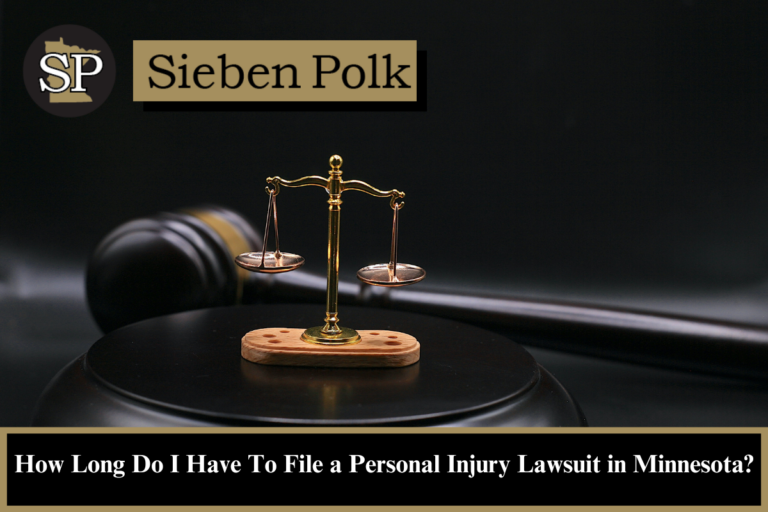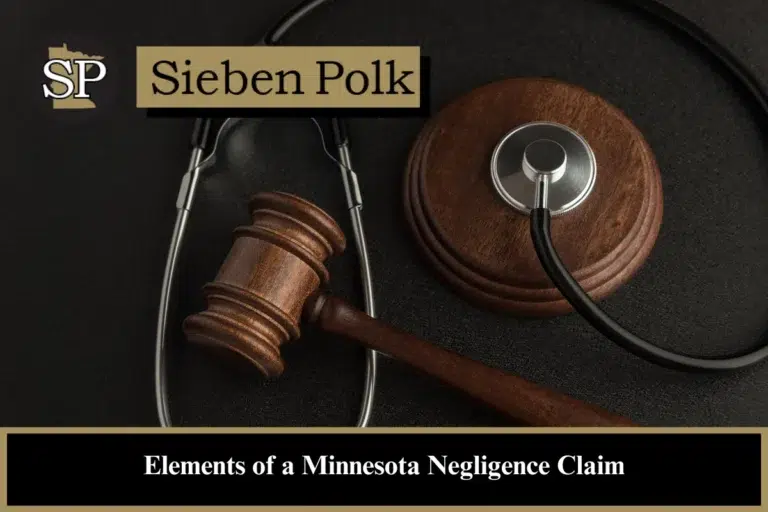If you’ve been injured due to someone else’s negligence, you have the right to pursue compensation. However, to do so, you must file your personal injury claim before the statute of limitations expires. This guide explains the Minnesota statute of limitations and how it affects your ability to file a claim.
Navigate This Page
- Statute of Limitations for Minnesota Personal Injury Claims
- The Discovery Rule in Minnesota Personal Injury Claims
- Exceptions to the Statute of Limitations in Minnesota
- Why Does the Statute of Limitations Matter?
- What Are My Options if I Miss the Statute of Limitations Deadline?
- How Our Minnesota Personal Injury Attorneys Can Help
- Related Reading
Statute of Limitations for Minnesota Personal Injury Claims
The statute of limitations is the legal deadline by which you must file your personal injury claim. Missing this deadline can result in your case being dismissed in court. In Minnesota, the general statute of limitations is six years, but this timeline can vary depending on the type of injury claim.
Key Time Limits for Personal Injury Claims in Minnesota
- Six years from the date of the injury if caused by someone else’s negligence.
- Three years from the date of death for a wrongful death claim.
- Four years from the date of the injury for medical malpractice or defective product claims.
Understanding these deadlines is crucial to pursuing your claim successfully.
The Discovery Rule in Minnesota Personal Injury Claims
In some cases, the statute of limitations may be extended using the “discovery rule.” This rule pauses the countdown until you discover—or should have discovered—your injury. It’s particularly relevant in cases involving latent injuries, such as those caused by medical malpractice or defective products.
When Does the Discovery Rule Apply?
The discovery rule is commonly used in medical malpractice and product liability cases where the injury is not immediately apparent. If this rule applies, it can give you additional time to file your claim, ensuring you’re not unfairly penalized by hidden or delayed injuries.
Exceptions to the Statute of Limitations in Minnesota
There are additional factors that may alter the statute of limitations deadline in Minnesota, giving you more time to file your claim.
Common Exceptions to the Statute of Limitation
- Minor Plaintiffs: The countdown begins on their 18th birthday.
- Mental Incapacity: The countdown starts when the plaintiff’s incapacity ends.
- Out-of-State Defendants: The countdown pauses if the defendant is outside of Minnesota.
These exceptions may provide more time to file your claim in certain circumstances.
Why Does the Statute of Limitations Matter?
Understanding the statute of limitations is crucial because failing to meet the deadline can result in losing your right to pursue compensation. Missing the deadline not only means your case will likely be dismissed, but it also weakens your position in settlement negotiations with the at-fault party or their insurance company.
The Importance of Filing on Time
Acting promptly ensures that you maintain the right to seek compensation and strengthens your bargaining power. Our Minnesota personal injury attorneys are here to make sure you meet all necessary deadlines and build a strong case for compensation.
What Are My Options if I Miss the Statute of Limitations Deadline?
If you miss the standard filing deadline, there may still be options available depending on your case’s specifics.
Can I Still File After the Deadline?
In some cases, you may still be able to pursue your claim if an exception applies or if there are other viable legal avenues. It’s important to consult with a Minnesota personal injury attorney who can assess your situation and determine your next steps.
How Our Minnesota Personal Injury Attorneys Can Help
Navigating the statute of limitations and ensuring your personal injury claim is filed on time can be complex. That’s why it’s essential to work with an experienced attorney.
Schedule a Free Consultation with Our Attorneys
Our legal team at Sieben Polk P.A. is ready to help you understand your rights and make sure your claim is filed within the appropriate timeframe. Contact us today for a free consultation to discuss your case. We work on a contingency fee basis, so you pay nothing unless we win your case.




